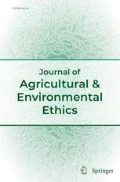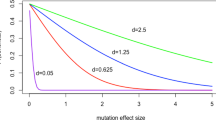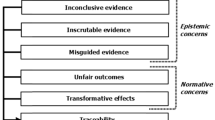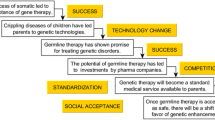Abstract
In today’s rapidly merging technological realms, basic necessity and morality of the society is often overlooked. Genetic Engineering, a great leap in human understanding of life sciences with possible impacts on every facet of life, is one such advancement. A technology which tampers with the nature at the DNA level and has the prowess to shuffle genes between distantly or even non-related organisms is bound to have gravid moral implications. Tagged with ecological, economic and bio-safety issues, it is being termed as an imprecise tool, which may cause irreversible damages. Apparently, it has shaken the age old, deeply entrenched ideologies of people around the globe leading to a massive uproar in the society. This synthesis is an attempt to dissect and analyze the ethical and moral repercussions of Genetic Engineering with special reference to Indian scenario.
Similar content being viewed by others
References
Acosta, A. (2000). Transgenic foods: Promise or peril? Americas, 52, 14–15.
Aris, A., & Leblanc, S. (2011). Maternal and fetal exposure to pesticides associated to genetically modified foods in Eastern Townships of Quebec, Canada. Reproductive Toxicology, 31, 528–533.
Boylan, M., & Brown, K. E. (2001). Genetic engineering: Science and ethics on the new frontier. USA: Prentice Hall.
CBD. (2000). Cartagena protocol on biosafety to the convention on biodiversity. July 19, 2012. http://bch.cbd.int/protocol/text/. Accessed August 1, 2012.
CICR. (2010). Cotton database, Central Institute for Cotton Research, Indian Council for Agriculture Research. http://www.cicr.org.in/Database/apy-irr.html. Accessed April 13, 2012.
Dorhout, D. L., & Rice, M. E. (2010). Intraguild competition and enhanced survival of western bean cutworm (Lepidoptera: Noctuidae) on transgenic Cry1Ab (MON810) Bacillus thuringiensis corn. Journal of Economic Entomology, 103, 54–62.
Einstein, A. (1941). Science, philosophy and religion, a symposium, the conference on science, philosophy and religion in their relation to the democratic way of life. New York: Inc.
Ewen, S. W., & Pusztai, A. (1999). Effect of diets containing genetically modified potatoes expressing Galanthus nivalislectin on rat intestine. Lancet, 354, 1353–1354.
FAO. (2001). Ethical issues in food and agriculture. FAO Ethics Series. Food and agriculture organization of the United Nations, Rome.
Glenn, L. M. (2004). Ethical issues in genetic engineering and transgenics. American Institute of Biological Sciences. http://www.actionbioscience.org. Accessed January 23, 2011.
Godfrey, J. (2000). Do genetically modified goods affect human health? Lancet, 355, 414.
Gupta, A. K., & Chandak, V. (2005). Agricultural biotechnology in India: Ethics, business and politics. International Journal of Biotechnology, 7, 1/2/3.
Jamieson, D. (2000). Discourse and moral responsibility in biotechnical communication. Science and Engineering Ethics, 6, 265–273.
Koepsell, D. (2007). The ethics of genetic engineering. Center for Inquiry Office of Public Policy, Washington D.C.
Macer, D. R. J. (2001). Bioethics: Perceptions of biotechnology and policy implications. International Journal of Biotechnology, 3, 116–133.
Malatesta, M., Boraldi, F., Annovi, G., Baldelli, B., Battistelli, S., Biggiogera, M., et al. (2008). A long term study on female mice fed on genetically modified soybean: Effects on liver ageing. Histochemistry and Cell Biology, 130, 967–977.
Marvier, M., McCreedy, C., Regetz, J., & Kareiva, P. (2007). A meta-analysis of effects of Bt-cotton and maize on non target invertebrates. Science, 316, 1475–1477.
Mepham, B. (2000). A framework for the ethical analysis of novel foods: The ethical matrix. Journal of Agricultural and Environmental Ethics, 12, 165–176.
Mesnage, R., Clair, E., Gress, S., Then, C., Szekacs, A., & Seralini, G-E. (2012). Cytotoxicity on human cells of Cry1Ab and Cry1Ac Bt insecticidal toxins alone or with glyphosate –based herbicide. Journal of Applied Toxicology. http://www.ncbi.nlm.nih.gov/pubmed/22337346. Accessed July 30, 2012.
Nandula, V. K., Reddy, K. N., Duke, S. O., & Poston, D. H. (2005). Glyphosate-resistant weeds: Current status and future outlook. Outlooks on Pest Management, 16, 183–187.
Polkinghorne, J. C. (2000). Ethical issues in biotechnology. Trends in Biotechnology, Nr.18, 8.
Preston, R. (2007). An error in the code. Annals of Medicine, VV(000), 30.
Riguad, N. (2008). Biotechnology: Ethical and social debates. OECD international futures project on “The bioeconomy to 2030: Designing a policy agenda” 1, 89. http://www.oecd.org/dataoecd/11/11/40926844.pdf. Accessed January 13, 2012.
Smith, J. (2009). Genetic roulette: the documented health risks of genetically engineered foods. USA. Yes ! Books. Indian Edition.
Thompson, P. B. (2000). Discourse ethics for agricultural biotechnology: Its limits and its inevitability. Science and Engineering Ethics, 6, 275–278.
Tierney, J. (2007). Are scientists playing god? It depends on your religion. The New York Times, November, 20, 2007. http://www.nytimes.com/2007/11/20/science/20tier.html?pagewanted=all. Accessed July 15, 2012.
Zwart, H. (2000). A short history of food ethics. Journal of Agricultural and Environmental Ethics, 12, 113–126.
Author information
Authors and Affiliations
Corresponding author
Rights and permissions
About this article
Cite this article
Kaur, A., Kohli, R.K. & Jaswal, P.S. Genetically Modified Organisms: An Indian Ethical Dilemma. J Agric Environ Ethics 26, 621–628 (2013). https://doi.org/10.1007/s10806-012-9429-4
Accepted:
Published:
Issue Date:
DOI: https://doi.org/10.1007/s10806-012-9429-4




